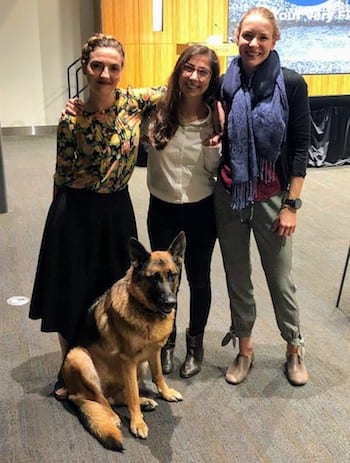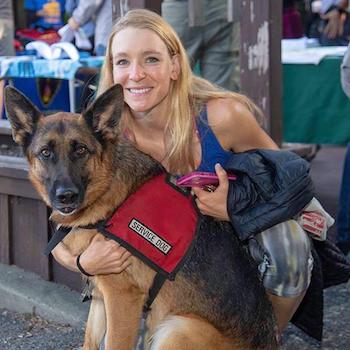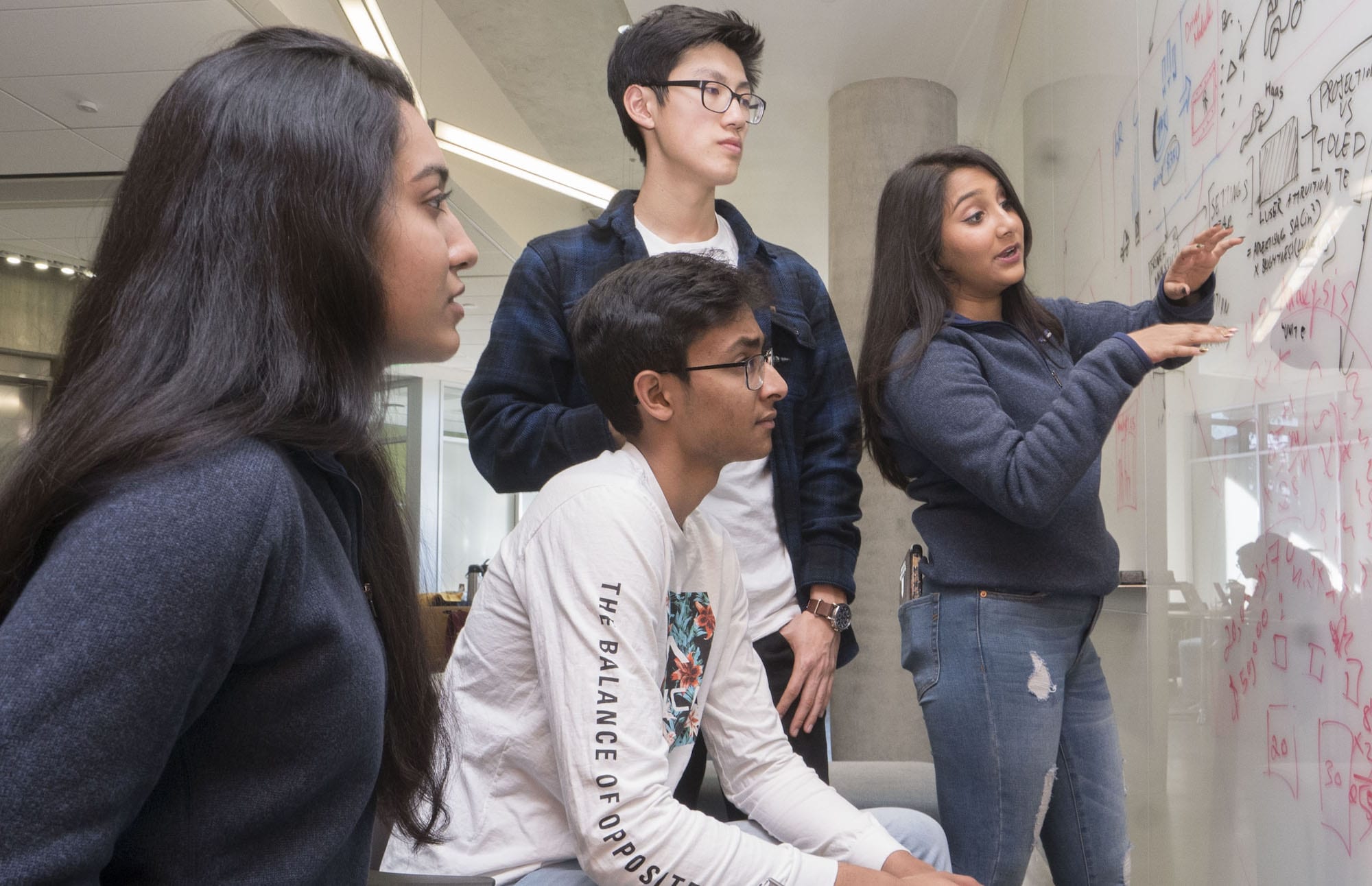Note: Haas News is following two of this year’s 25 teams participating in LAUNCH, an accelerator for UC startup founders that has helped create more than 200 companies since 1999. They are gearing up for Demo Day in April, when they’ll pitch their ideas to VCs and angel investors and compete for $25,000 in funding.
The two teams are pitching startup ideas that are worlds apart: one is trialing dog food made from—wait for it—insects, while the other is coding software that will power advertising displays used by ride-sharing vehicles.
What do both teams have in common? Big plans to scale their ventures.
At LAUNCH boot camp at the end of January, all 25 teams were assigned mentors. Here’s more on the startups.
SuperPetFoods

SuperPetFoods founders: The all-woman startup team includes María del Mar Londoño, MBA 21, Thais Esteves, MBA 21, a former veteran BCG consultant in banking and impact investment, and Gina Myers, MS 20 (bioengineering), a chef who trained at the Culinary Institute of America. Gina is in charge of product development. “When Gina mentioned she had done nine Ironman races I immediately knew she was up for the challenge,” says María, who goes by Mar. “On the other side, there’s Thais, whose solid finance background has been critical to quantify the scalability of our idea. She’s also a fabulous sounding-board.”
The story: Mar grew up on a farm in the verdant, biodiverse coffee-growing region of Colombia, surrounded by more than 15 dogs. Her family was in the animal feed business, using non-conventional raw materials, so it’s no surprise that Mar is continuing that quest to find alternative, more sustainable ways to feed pets.
The “aha moment”: When Mar’s cousin started producing black soldier flies (Hermetia Illucens) on the Colombian farm and introduced her to the insect, she became intrigued by the idea of making it the basis for pet food. “It is a truly remarkable insect, capable of converting food waste into high-quality protein and fat with incredible efficiency, with an undetectable carbon footprint,” she says. Used to feed both poultry and fish, she saw an opportunity to use the larvae in dog food because it’s nutritious, digestible, and has a nutty, smokey taste. “These insects hold the massive potential to reimagine the food system,” she says.
Previous accolades and upcoming competitions: Winner at UC Berkeley’s StEP Demo Day, where she met her co-founders. In the upcoming months, they will be participating in two competitions where they are finalists: The Hult Prize Regional Competition and the 2020 Rabobank-MIT Food and Agribusiness Innovation Prize.

What they’re up to at LAUNCH: SuperPetFoods is in very early-stage work on the product, Mar says. “We need to work on product development and packaging and the overall execution of our idea—and do that in tandem with getting customer insights, and learning the most important problems that pet owners face,” she says.
Most enthusiastic test subject: Gina’s German Shepherd, Qora, is a key member of the team as QA controller, in charge of tasting. Qora has already erased one of the team’s first fears: that the food wouldn’t taste good. In the first trial, they loaded the food with sweet potato and peanut butter. But it turned out that they didn’t need all that filler. Qora gobbled it up without it.
Team mentor: Urban farmer John Matthesen, an adjunct professor in culinary arts, who teaches a farm-to-table cooking lab at Diablo Valley College. John is general manager at Biome Makers, a company that’s using the latest technology to test agricultural soil health.
Biggest challenge: Marketing dog food made with insects in the U.S. “The first time Mar told me about the flies I saw huge potential,” Thais says. “It’s about changing the minds of people. Dogs are not that picky and this is better for the environment.”
BumpR

BumpR founders: Armaan Goel, Aishwarya (Ash) Mahesh, Shreya Shekhar, all M.E.T. 23 (Management, Entrepreneurship & Technology) students, Justin Quan, BS 23 (Electrical Engineering & Computer Science).
Origin of the idea: In high school, Ash developed an idea for YAPnGO, a digital bumper sticker. When she got to Berkeley, she discussed the idea with fellow undergrads Armaan, Justin, and Shreya, and they realized that the technology could be used as an advertising display for ridesharing vehicles. They entered BumpR in the AccelerateHer immersive startup weekend at Haas and that led to LAUNCH. Bumpr is building a cloud-based, back end for advertising displays that intelligently targets advertisements to strategic consumer demographics.
Why they applied to LAUNCH: To learn about startup creation outside of the traditional classroom. “It’s one of the main things that brought me to Cal and how I wanted to spend my next four years,” Justin says. “There’s so much raw passion for entrepreneurship among students here and it’s a privilege to be a part of it.”
Accolades: AccelerateHer winner, Trione grant recipient, SkyDeck Hotdesk team, and 1st place at Entrepreneurs@Berkeley Pitch Competition.
Where they’re at now: The team already pivoted from focusing on hardware to developing software for physical advertising. “Pivots are a healthy indicator that teams are actively testing their hypotheses to get to the ground truth,” says their LAUNCH instructor Rhonda Shrader, executive director of the Berkeley Haas Entrepreneurship Program. “Sometimes that leads to a scalable business model, sometimes it doesn’t. We celebrate either outcome as a “win” for learning and a solid outcome for LAUNCH.”
Armaan and Ash are now working through the business model to see if it makes sense. Justin and Shreya are looking at industry competitors and working on the technology’s implementation.
Biggest challenge: Dealing with the technology used in outdoor digital advertising, which is extremely outdated. Also, advertising monopolies make it a difficult industry to break into, Shreya says.
Do they think their team will win at Demo Day? Armaan says that LAUNCH isn’t about winning. “It’s about making the most out of the opportunity and being challenged by the program,” he says. “No matter what happens we’ll come out of it a better team.”